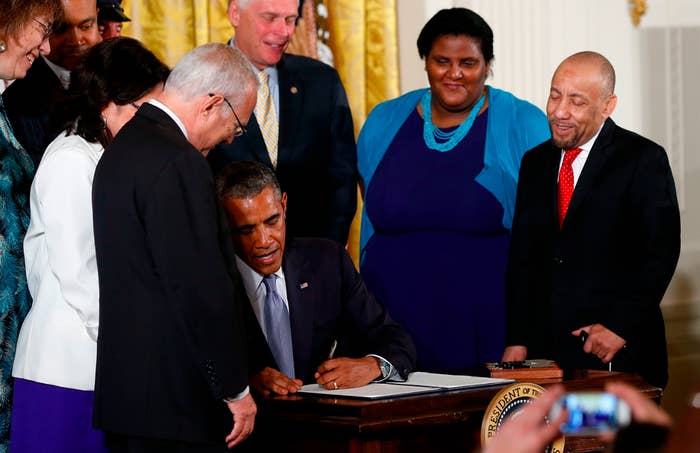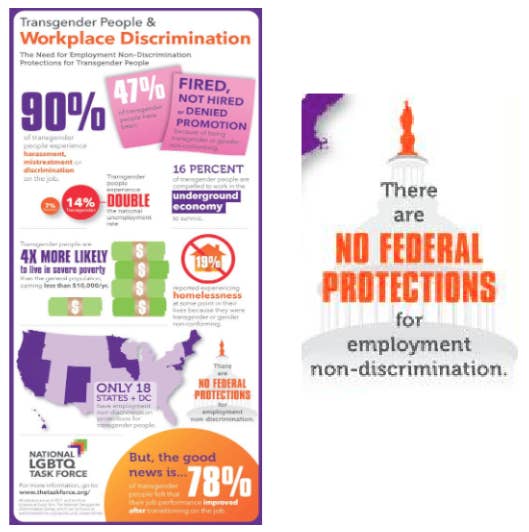
WASHINGTON — Advocates have had a tough time advancing federal LGBT workplace protections for decades — and yet, in the Obama era, one of the rare successes on that front has proven to be the most divisive.
How to best achieve the legal protections has become a contentious issue under the Obama administration. Advocates have had to make complex lobbying decisions: Should they push for new legislation to protect LGBT workers, executive action to help some LGBT workers, or both?
After President Obama took the executive action path off the table for the time being in April 2012, a federal agency — the Equal Employment Opportunity Commission — gave transgender workers their biggest victory ever by ruling that the ban on "sex discrimination" in the Title VII of the Civil Rights Act includes anti-transgender discrimination.
Many LGBT groups, however, were slow to embrace the ruling at first, which is binding on the federal government but not courts — although they give deference to the agency ruling. As time wore on, more and more groups began embracing the decision — with a few LGBT groups taking cases to the EEOC on behalf of transgender clients. Even then, many groups have been loathe to highlight the EEOC decision, as they press for passage of the federal bill to ban LGBT job bias, the Employment Non-Discrimination Act; other federal efforts; or similar state efforts.
Now, with the legislative route basically closed to LGBT advancements for the remainder of the Obama administration with a newly elected Republican Congress, most LGBT organizations are pushing the EEOC ruling as a key tool for fighting discrimination — except one.
In a new graphic released last month, the National LGBTQ Task Force claimed that "[t]here are no federal protections for employment non-discrimination" for transgender people.
A commissioner of the EEOC, Chai Feldblum, says the Task Force is painting an "incomplete" picture of legal protections for LGBT people in America — specifically, by understating the work of the EEOC. Several other LGBT organizations, in comments to BuzzFeed News this week, echo that criticism, with a Human Right Campaign spokesman saying that "[t]he fact that it's incomplete makes it wrong."
The 2012 EEOC decision came from the case of Mia Macy, who challenged anti-transgender discrimination by bringing a complaint accusing the Bureau of Alcohol, Tobacco, Firearms and Explosives of violating the Title VII ban on sex discrimination. The EEOC, in a unanimous decision, agreed with Macy — setting the agency and the federal government on a path in which that interpretation was reality. The Justice Department found in favor of Macy's claim a year later, and the EEOC began investigating other complaints of anti-transgender discrimination.
Asked about the graphic, Kylar Broadus, the Task Force's senior public policy counsel and Transgender Civil Rights Project director, said in a terse statement, "The Task Force follows the Macy decision rendered by the Equal Employment Opportunity Commission (EEOC) which is an administrative agency and not a court of law. EEOC rulings are used as guidance by courts of law in most instances. Courts aren't bound by EEOC rulings but usually give great deference to them. Court decisions rendered by appeals courts become law. A case has to be brought to win or set precedent in a particular circuit which is why there is still need for a federal statute protecting workers."
Although EEOC rulings are not binding on the courts, courts do give deference to the agency's interpretation — and two federal appellate courts have, even before the Macy decision, had found that sex discrimination prohibitions under Title VII or the equal protection clause protected against anti-transgender discrimination. In recent months, moreover, the EEOC went beyond resolving complaints within the agency — filing lawsuits in Michigan and Florida using Title VII in suing companies for anti-transgender discrimination.
Finally, Broadus said in his statement, "A federal statute would provide protection across the country for everyone and curtail the need for more litigation."
The federal legislation, long sought by LGBT advocates, has been the Employment Non-Discrimination Act, which provides explicit protections based on sexual orientation and gender identity and passed the Senate last year. It has no support from the Republican leadership in the current House, however, and last week's midterm election results make the chance of pro-LGBT legislation even more unlikely in the next Congress.
Feldblum, the first and only out LGBT EEOC commissioner, helped draft ENDA before her appointment to the EEOC and, in response to an inquiry from BuzzFeed News about the matter, noted that she, like the Task Force, continues to support the idea of such legislation, writing, "I agree that a strong federal law (one without any exemptions beyond those of current civil rights laws ) is very important to enact for purposes of certainty of protection."
Further, she noted, "I also agree that EEOC determinations are not binding on the courts. Indeed, our agency sometimes argues positions that are not accepted by the courts. So the statement ... is not wrong as a legal matter."
"But it is incomplete — both as a legal and practical matter," she countered. "It fails to capture the reality that the EEOC currently helps thousands of individuals each year get recourse (& remedies) for their discrimination claims, without ever going to court. And they get that through the legal system set up for administrative relief via the EEOC. And that is what our 53 EEOC offices across the country are now doing right now for LGBT people under our Title VII jurisdiction. Thus, there are practical remedies being achieved through the administrative system right now in every state in the country."
More than that, as noted, the agency has gone to court with their interpretation, bringing lawsuits last month in Michigan and Florida on behalf of transgender workers who faced employment discrimination.
"To begin where I started," Feldblum concluded, "that doesn't mean an explicit federal law is unnecessary. To the contrary, it would be hugely helpful. It's just important not to downplay the real practical protection that exists now."

The unusual decision for an EEOC commissioner to speak out against the actions of an advocacy group was buttressed by other LGBT organizations, who echoed Feldblum's criticism in statements provided to BuzzFeed News in response to inquiries.
"I agree with Commissioner Feldblum. Their statement is incomplete," the executive director of the National Center for Transgender Equality, Mara Keisling, said of the Task Force's comment. "We strongly believe job discrimination against trans people is illegal everywhere in this country under Title VII."
HRC's Sainz was more direct, saying of the Task Force's statement, "We certainly don't agree with those sentiments. The fact that it's incomplete makes it wrong."
Tico Almeida, the president of Freedom to Work, said he was "confused and a little bit saddened" by the Task Force's statement, saying it "downplay[s] the real legal protections that currently exist thanks to the tremendous EEOC victory achieved by the courageous Mia Macy."
No Task Force officials emailed on Tuesday evening responded to a request for a response to Feldblum's comments.
It's not just the Macy decision, either. President Obama eventually did sign the executive order that he rejected in 2012, leading the Department of Labor to draft regulations, expected to be finalized in coming months, barring federal contractors from discriminating on the basis of sexual orientation or gender identity. The order expands a prior order, enforced by the Office of Federal Contract Compliance Programs within the Labor Department, that bars contractors from discriminating on the basis of race, color, religion, sex, or national origin.
The problems of inconsistent education about and application of the current legal protections, in addition to the fact that they have not been buoyed by a definitive federal court ruling, and the lack of explicit LGBT protections, are real. As Keisling said, "[I]n most states, the protections are not as clear as they need to be for employers and employees. We need state and local laws, as well as an explicit federal law, to make it absolutely clear to everyone that trans people have rights."
On a point where the Task Force, other advocates, and Feldblum agree, HRC's Sainz noted, "Since the Supreme Court has yet to address either gender identity or sexual orientation claims under Title VII, a federal non-discrimination law will ensure long term protections for LGBT workers and provide additional clarity to employers about their obligations to LGBT people." He added that "[a]dministrative and court success compliment efforts to attain full protections for LGBT people legislatively."
Freedom to Work, along with Lambda Legal, has put that concept to work — further confounding Almeida as to why the Task Force has staked out the position it has — by successfully litigating a case before the EEOC on behalf of a transgender person.
"I would like to see the big national LGBT organizations use their ample budgets on a public education campaign to promote the historic nature of the Macy decision so that more LGBT Americans will know that the EEOC is open for business and willing to help," he said.
The biggest of those groups, HRC, had been slow to talk about the effect and impact of the Macy decision, but — particularly in light of last week's election results — appears to be ready to take up Almeida's challenge.
"Both the Macy v. Holder EEOC decision and the Office of Federal Contact Compliance Programs (OFCCP) Directive 2014-2 have provided real, immediate remedies for transgender workers," HRC's vice president for communications, Fred Sainz, told BuzzFeed on Tuesday, referencing the OFCCP's order — years after the issue was first raised — applying the Macy decision to existing federal contractor protections.
"In addition, LGB people may also have claims under Title VII if they have experienced discrimination that involves sex stereotyping," Sainz added, noting an area where recent EEOC decisions suggest further change could be coming. "Any LGBT worker who has experienced gender identity or sexual orientation based discrimination should consider filing a complaint with the EEOC. Once the amendments to Executive Order 11246 go into effect, LGB people working for a federal contractor who has a new or renewed contract may file a complaint with OFCCP. Transgender people working for a federal contractor who experience discrimination may file with OFCCP immediately."
Additional language was added to the story to clarify that EEOC Commissioner Feldblum made the statement in response to an inquiry from BuzzFeed News.
